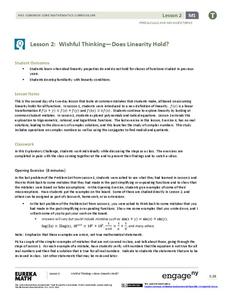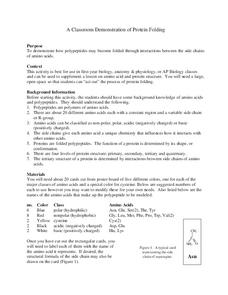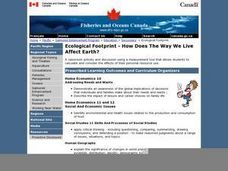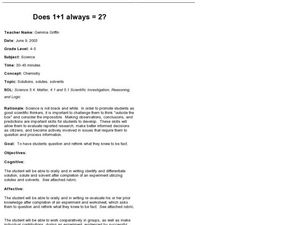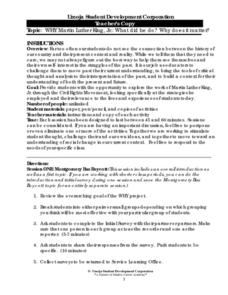EngageNY
Wishful Thinking—Does Linearity Hold? (Part 2)
Trying to find a linear transformation is like finding a needle in a haystack. The second lesson in the series of 32 continues to explore the concept of linearity started in the first lesson. The class explores trigonometric, rational,...
Intel
What Does This Graph Tell You?
What can math say about natural phenomena? The fifth STEM lesson in this project-based learning series asks collaborative groups to choose a phenomenon of interest and design an experiment to simulate the phenomenon. After collecting...
Colorado State University
Why Does it Get Colder on a Clear Night than a Cloudy Night?
Clouds are nature's insulator! A lab investigation asks learners to use an infrared thermometer to measure differences in infrared temperatures. They find that pointing the thermometer at a cloud has a much different result than pointing...
Missouri Department of Elementary
What Does Respect Look Like at Home?
Individuals consider why is it important to respect family members as they complete a self-respect survey to assess their respectful behaviors at home. They then choose three items from the survey and write about how they plan to improve...
K12 Reader
Why Does the Moon Orbit Earth?
Have you ever looked up at the moon and wondered why it looks different every night? Learn about the moon's orbit and the lunar cycle with a reading comprehension exercise. Using context clues, kids find the definitions of unfamiliar...
Curated OER
Does It Move On It's Own?
Young scientists look at drawings of six animals, then match up a word that describes how they move. The words are: hop, crawl, swim, fly, run, and jump. They also answer two additional questions about the animals and how they move. A...
Curated OER
The Health Triangle
What else does physical health include besides exercise and nutrition? How can I support my mental health? Does social health just refer to relationships with friends? How are all of these questions vital to the body's overall efficiency...
Southwestern Medical Center
A Classroom Demonstration of Protein Folding
Does the mention of proteins and polypeptide relationships in your classroom result in mass confusion? Does the attempt to teach this important concept generate multiple questions and, at times, lead to a room filled with blank...
Teacher's Corner
Hey Batter, Wake Up!
Does jet lag affect a baseball team's performance in games? Read about how a baseball team's chance of winning a game can be affected by traveling over one, two, and three time zones. Readers then respond to five short answer questions...
CK-12 Foundation
Car Collision
When a car crashes into a wall, does it just stop or does it bounce or roll backwards? A simulation relates velocity, kinetic energy, momentum, and restitution to answer this question. Scholars apply their knowledge through...
Curated OER
Where Does Food Come From?
Distinguish between food and non-food items. Recognize that food is obtained from both plant and animal sources. Identify sources for some common animal foods then construct a simple food path from the farm to the consumer.
Curated OER
What Does Earth Day Mean? - Biology Teaching Thesis
Students possible sources of water pollution, and explain the effects that water pollution can have on the food on the food chain. They Name human and other animal (i.e. fish) illnesses that can be contracted from drinking polluted...
Curated OER
Ecological Footprint--How Does The Way We Live Affect Earth?
Learners demonstrate an awareness of the global implications of decisions that individuals and families make about their needs and wants. They identify environmental and health issues related to the production and consumption of food....
Curated OER
Number and Operation: All About Monday - Does it Pay?
Solve real-world financial math problems. High schoolers will work through a series of problems as they look at credit card interest, bill payment, and other real-world personal money matters.
Curated OER
Does the Sidewalk Drink Puddles?
Learners participate in an experiment about evaporation. In this water cycle lesson, students use water, thermometers, and measuring tools to make a puddle and measure the size four times throughout the day. Learners discuss their data...
Curated OER
How does Physical activity Help You?
Examine factors that influence your choice about physical activity. In this physical activity lesson, students recognize how physical activity and good health go together. Students participate in a survey about physical...
Curated OER
Does 1 + 1 always = 2
What a great way to explore the scientific process! Learners conduct an experiment in which they use sugar and water to illustrate the concept of solutes and solvents. With this hands on approach, they are bound to remember what they...
Forest Foundation
Fire - How Does it Relate to You?
Forest fires can be a necessary step in keeping a forest healthy, but what happens when they get out of control? Learners investigate the causes and effects of forest fires in two specific areas, culminating in a report about the ways...
Curated OER
Living in a Digital World
What does it mean to be a good digital citizen? Is it the same as face-to-face communication? In small groups, learners discuss the differences between digital and non digital life, how they are different and what each environment can...
Curated OER
The Present Subjunctive: How?
Once your class has mastered the indicative, it's time to present the subjunctive mood. This resource focuses solely on how to conjugate in the present subjunctive, but does link to more information on how to to use it. Class members can...
TED-Ed
A Brief History of Religion in Art
Did you know that some languages have no word for art? The English language does and the narrator of this short video discusses the aesthetic dimension of religious art as it "visually communicates meaning beyond language."
Umoja Student Development Corporation
Martin Luther King, Jr.: What Did He Do? Why Does It Matter?
Young historians examine the work of Martin Luther King Jr. by reading and answering questions about the Montgomery Bus Boycott, the Albany Movement, the Birmingham and Chicago campaigns, and the Memphis Sanitation Worker's Strike....
NASA
Discovering Some of Your “Yardsticks” Are Actually “Meter-sticks”
The Milky Way gets great reviews on Trip Advisor — 100 million stars. The activity allows scholars to rethink their assumptions and prior knowledge. Pupils observe a set of two lights at equal distance and brightness, but they believe...
Teach Engineering
Who Can Make the Best Coordinate System?
Working with a map that does not have a coordinate system on it, small, collaborative teams must come up with a coordinate system for their map. Groups then explain their coordinate structure to the class.
Other popular searches
- Picture Does Not Belong
- Life Doesn't Frighten Me
- Al Capone Does My Shirts
- Do and Does
- Sentence Doesn't Belong
- Which Word Does Not Belong
- Beatrice Doesn't Want To
- Does Not Belong
- How Does Light Travel
- Sentence Does Not Belong
- Which Does Not Belong
- Anansi Does the Impossible
